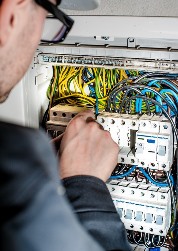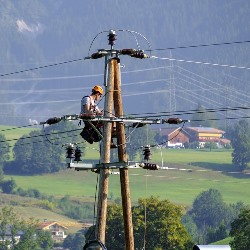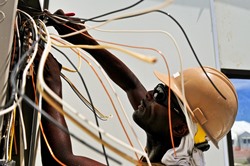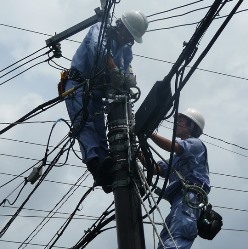How to Choose the Right Electrician Training School near Continental Arizona
 The initial step to becoming an electrical tradesman or contractor is enrolling in an electrician trade school near Continental AZ. But with so many vocational schools to select from, just how do you undertake making certain that you enroll in the ideal one? Particularly since there are so many points to consider. For instance, some students will begin by searching for schools that are close to their home. After they have identified several that are within driving distance, they will decide on the one with the most affordable tuition. Even though cost and location are important, they are not the only factors that should be evaluated. Also important are the accreditation and reputations of the schools, along with their job placement and graduation rates. These and other qualifications should influence your final judgment when choosing an electrician school. We will discuss that checklist in greater detail later in this post. But first, let’s review a little bit about being an electrician and the educational options that are offered.
The initial step to becoming an electrical tradesman or contractor is enrolling in an electrician trade school near Continental AZ. But with so many vocational schools to select from, just how do you undertake making certain that you enroll in the ideal one? Particularly since there are so many points to consider. For instance, some students will begin by searching for schools that are close to their home. After they have identified several that are within driving distance, they will decide on the one with the most affordable tuition. Even though cost and location are important, they are not the only factors that should be evaluated. Also important are the accreditation and reputations of the schools, along with their job placement and graduation rates. These and other qualifications should influence your final judgment when choosing an electrician school. We will discuss that checklist in greater detail later in this post. But first, let’s review a little bit about being an electrician and the educational options that are offered.
Click Here to Get Free Information on Electrician Schools Near You!
Electrician Degree, Diploma and Certificate Options
 There are three general ways to receive electrician instruction in a trade or technical school near Continental AZ. You may choose a certificate or diploma program, or receive an Associate Degree. Bachelor’s Degrees are available at some schools, but are not as prevalent as the first three options. In many cases these programs are made available in conjunction with an apprenticeship, which are mandated by most states in order to become licensed or if you intend to earn certification. Following are brief explanations of the three most common programs offered.
There are three general ways to receive electrician instruction in a trade or technical school near Continental AZ. You may choose a certificate or diploma program, or receive an Associate Degree. Bachelor’s Degrees are available at some schools, but are not as prevalent as the first three options. In many cases these programs are made available in conjunction with an apprenticeship, which are mandated by most states in order to become licensed or if you intend to earn certification. Following are brief explanations of the three most common programs offered.
- Diploma and Certificate Programs are generally offered by Arizona vocational and trade schools and take approximately a year to complete. They furnish a solid foundation and are geared towards those who would like to get into an apprenticeship more quickly as a journeyman electrician.
- Associate Degree Programs require two years to complete and are provided by Arizona community colleges, usually as an Associate Degree in Electrical Technology. They offer a more extensive education while supplying the foundation that readies students to enter into their apprenticeship program.
As previously stated, Bachelor’s Degrees are offered at some Arizona colleges, but are less preferred at four years than the other shorter programs. Most states require that an apprenticeship of at least 2 years and more typically four years be completed before licensing. Therefore, many students are anxious to start their paid apprenticeship, especially if it’s not a component of their academic program.
Electrician Certification and Licensing Criteria
 Electricians in Continental AZ can undertake a wide range of services, including testing, installing and replacing electrical systems, and making sure that the wiring in buildings and homes are up to code standards. After concluding an apprenticeship, journeyman electricians are required to become licensed in most states or municipalities. The length of apprenticeship differs by state, but normally around four to five years of practical experience is required before taking the licensing exam. The exams usually evaluate general knowledge and electrical theory, along with knowledge of the National Electrical Code (NEC). Receiving certification is also an optional means for an electrician to distinguish him or herself as a skilled and experienced professional. The certifications offered differ by state and may be obtained in various specializations, including cable splicing as an example. The certification procedure usually entails three levels of proficiency:
Electricians in Continental AZ can undertake a wide range of services, including testing, installing and replacing electrical systems, and making sure that the wiring in buildings and homes are up to code standards. After concluding an apprenticeship, journeyman electricians are required to become licensed in most states or municipalities. The length of apprenticeship differs by state, but normally around four to five years of practical experience is required before taking the licensing exam. The exams usually evaluate general knowledge and electrical theory, along with knowledge of the National Electrical Code (NEC). Receiving certification is also an optional means for an electrician to distinguish him or herself as a skilled and experienced professional. The certifications offered differ by state and may be obtained in various specializations, including cable splicing as an example. The certification procedure usually entails three levels of proficiency:
- An experience requirement
- Passing a written exam
- Passing a practical exam
Examples of certifying agencies include the National Joint Apprenticeship and Training Committee (NJATC) as well as the National Institute for Certification in Engineering Technologies (NICET). It’s important that the electrician tech school that you enroll in not only provides a solid academic foundation, but also helps prepare you for passing any licensing and certification examinations that you might need to pass in the future.
Attending Electrician Training Classes Online
 An option that you may have contemplated is enrolling in an online electrician program to earn a certificate or degree. While online schools are becoming more accepted as a way of attending class without needing to travel, in this situation they are not totally internet based. Just about all electrician training programs require partial attendance on-campus to receive practical hands-on training. But since the rest of the classes can be accessed online, internet learning can be a more convenient option for students that have limited time for education. And as an added benefit many online schools have a lower tuition cost compared to their on campus alternatives. Travelling costs from Continental AZ are also lessened and a portion of the study materials can be available on line as well. Each of these advantages can make online electrician vocational schools more economical and convenient. And a number are fully accredited, which we will cover in our due diligence checklist.
An option that you may have contemplated is enrolling in an online electrician program to earn a certificate or degree. While online schools are becoming more accepted as a way of attending class without needing to travel, in this situation they are not totally internet based. Just about all electrician training programs require partial attendance on-campus to receive practical hands-on training. But since the rest of the classes can be accessed online, internet learning can be a more convenient option for students that have limited time for education. And as an added benefit many online schools have a lower tuition cost compared to their on campus alternatives. Travelling costs from Continental AZ are also lessened and a portion of the study materials can be available on line as well. Each of these advantages can make online electrician vocational schools more economical and convenient. And a number are fully accredited, which we will cover in our due diligence checklist.
Questions to Ask Electrician Tech Schools
 Now that you have decided to earn a diploma, certificate or degree, you can begin to focus your training options. Since there are so many electrician vocational and trade schools in the Continental AZ area, it’s important to have a checklist of qualifications that each school must satisfy. The first 2 that we discussed were location and tuition expense. If you are interested in earning an online degree, then that must be a feature that your chosen school offers. And while all three qualifiers may be crucial when making your selection, there are additional variables that need to be taken into account also. Following is a checklist of those additional qualifiers that you will need to research before choosing an electrical trade school.
Now that you have decided to earn a diploma, certificate or degree, you can begin to focus your training options. Since there are so many electrician vocational and trade schools in the Continental AZ area, it’s important to have a checklist of qualifications that each school must satisfy. The first 2 that we discussed were location and tuition expense. If you are interested in earning an online degree, then that must be a feature that your chosen school offers. And while all three qualifiers may be crucial when making your selection, there are additional variables that need to be taken into account also. Following is a checklist of those additional qualifiers that you will need to research before choosing an electrical trade school.
Accreditation. A large number of electrician vocational schools have acquired either a regional or a national accreditation. They may earn Institutional Accreditation, which focuses on the school’s programs as a whole, or Programmatic Accreditation, which pertains to a specific program, for example electrical technology. Verify that the Continental AZ school and program are accredited by a U.S. Department of Education recognized accrediting agency, such as the Accreditation Board for Engineering and Technology. Along with helping guarantee that you obtain an excellent education, it can help in securing financial aid or student loans, which are often not available for non-accredited programs. Additionally, some states mandate that the electrician training course be accredited in order to qualify for licensing.
High Completion and Placement Rates. Ask the electrician training programs you are looking at what their completion rates are. The completion rate is the portion or percentage of students who enroll in and complete the course. A lower completion rate could suggest that students were unhappy with the course and quit. It could also mean that the instructors were not qualified to instruct the students. It’s also imperative that the schools have high job placement rates. Older and/or more reputable schools may have a broader list of alumni, which can produce more contacts for the school to use for their apprenticeship and job placement programs. A high job placement rate can not only affirm that the school has a good reputation within the industry, but additionally that it has the network of contacts to help Continental AZ graduates secure apprenticeships or jobs.
Apprenticeship Programs. Most electrician technical programs are taught together with an apprenticeship or an internship program. Those participating trade and vocational schools will help place you in an apprenticeship program within their network of electrical contractors or trade unions. Check if the schools you are comparing have working relationships with Continental AZ area electricians or electrical professionals. An apprenticeship not only provides a rewarding experience by supplying hands-on training, but it also provides job opportunities and helps to form relationships in the regional electrician professional community.
Modern Facilities. Make certain that the campus facilities and the equipment that you will be instructed on are state-of-the-art and what you will be working with on the job. If you are already in an internship or an apprenticeship, check with the electrical specialist you are working under regarding what you should be looking for. Otherwise, ask a local Continental AZ electrical contractor if they can provide some suggestions. Also bear in mind that unless you can relocate, the school needs to be within commuting distance of your Continental residence. Take note that if you decide to enroll in an out-of-state school, besides the added moving costs there can be increased tuition charges compared to in-state residents.
Smaller Classes. It’s desirable that you receive as much individualized instruction as possible, which can be challenging in bigger classes. Ask if you can sit in on some of the classes so that you can observe how big they are and witness first hand the interaction between instructors and students. Talk to a few of the students and get their opinions concerning class sizes and instruction. Last, talk with a few of the teachers and learn what their level of expertise is and what certifications or degrees they have earned.
Flexible Scheduling. Verify that the class schedules for the schools you are assessing are flexible enough to fulfill your needs. If you can only attend classes in the evening or on weekends near Continental AZ, confirm that the programs you are reviewing offer those choices. If you can only attend on a part-time basis, make sure that the school you select allows part-time enrollment. Additionally, check out what the policy is to make-up classes should you miss any because of work, sickness or family issues.
Electrician Schooling Requirements Continental Arizona
 Selecting the best electrician training program will probably be the most important decision you will make to launch your new profession. You originally came to this website due to an interest in Electrician Schooling Requirements and wanting more information on the topic Home Electrical Courses. But as we have covered in this article, there are several factors that you will need to evaluate and compare among the training programs you are considering. It’s a necessity that any electrician training program that you are assessing includes a lot of hands-on training. Classes need to be smaller in size and every student must have their personal equipment to train with. Classroom instruction should offer a real-world context, and the curriculum should be current and conform with industry standards. Training programs differ in duration and the type of credential provided, so you will need to decide what length of program and credential will best satisfy your needs. Each training program offers different options for certification also. Perhaps the best way to research your short list of schools is to visit each campus and speak with the students and instructors. Invest some time to monitor some classes. Tour the campus and facilities. Make certain that you are confident that the school you decide on is the right one for you. With the proper training, effort and commitment, the end outcome will be a new occupation as a professional electrician in Continental AZ.
Selecting the best electrician training program will probably be the most important decision you will make to launch your new profession. You originally came to this website due to an interest in Electrician Schooling Requirements and wanting more information on the topic Home Electrical Courses. But as we have covered in this article, there are several factors that you will need to evaluate and compare among the training programs you are considering. It’s a necessity that any electrician training program that you are assessing includes a lot of hands-on training. Classes need to be smaller in size and every student must have their personal equipment to train with. Classroom instruction should offer a real-world context, and the curriculum should be current and conform with industry standards. Training programs differ in duration and the type of credential provided, so you will need to decide what length of program and credential will best satisfy your needs. Each training program offers different options for certification also. Perhaps the best way to research your short list of schools is to visit each campus and speak with the students and instructors. Invest some time to monitor some classes. Tour the campus and facilities. Make certain that you are confident that the school you decide on is the right one for you. With the proper training, effort and commitment, the end outcome will be a new occupation as a professional electrician in Continental AZ.
More Electric Locations in Arizona
Continental climate
Continental climates often have a significant annual variation in temperature (hot summers and cold winters).[specify] They tend to occur in the middle latitudes (40 to 55 north), where prevailing winds blow overland, and temperatures are not moderated by bodies of water such as oceans or seas. Continental climates occur mostly in the Northern Hemisphere, which has the kind of large landmasses on temperate latitudes required for this type of climate to develop. Most of northern and northeastern China, eastern and southeastern Europe, central and southeastern Canada, and the central and upper eastern United States have this type of climate.[1]
In continental climates, precipitation tends to be moderate in amount, concentrated mostly in the warmer months. Only a few areas—in the mountains of the Pacific Northwest of North America and in Iran, northern Iraq, adjacent Turkey, Afghanistan, Pakistan, and Central Asia—show a winter maximum in precipitation. A portion of the annual precipitation falls as snowfall, and snow often remains on the ground for more than a month. Summers in continental climates can feature thunderstorms and frequent hot temperatures; however, summer weather is more stable than winter weather.
The timing of intermediate spring-like or autumn-like temperatures in this zone vary depending on latitude and/or elevation. For example, spring may arrive as soon as early March in the southern parts of this zone or as late as May in the north. Annual precipitation in this zone is usually between 600 millimetres (24 in) and 1,200 millimetres (47 in), most of it in the form of snow during winter. It also has cold winters and warm summers.
Business Results 1 - 10 of 42













